My Enquiry (0)
No artwork has been selected.
Please choose an artwork to enquire.
Enquiry Submitted
Thank you for your enquiry and interest in our artists’ work. A member of the gallery team will respond shortly.
000%
6 June - 22 August 2024
Southern Guild is pleased to present 'Six Prayers' by Franco-Beninois artist King Houndekpinkou, a series of six large-scale ceramic sculptures, from 6 June to 22 August, 2024.
Known for his distinctive vocabulary of shape, texture and colour, Houndekpinkou’s work revels in unexpected hybridities, the product of a diasporic world-view that resists cultural borders. He has developed an explorative practice that blends tradition and ancient spirituality
with modern techniques, drawing heavily from Japanese and West African culture.
Born in Montreuil, France to Beninese parents in 1987, Houndekpinkou grew up in the suburbs of Paris. His adolescence was shaped by his discovery of Japanese pop culture, anime and video games. A trip to Japan in 2012 awakened an interest in the country’s ancestral pottery, whose ceremonial approach to craft and Shintoism resonated strongly with the animism of Beninese Voudou.
Houndekpinkou’s guiding philosophy, the interdependence and divine nature inherent in all aspects of life, is evidenced in his approach to this body of work. Through alchemical processes of clay-making and new forms of magic, sacred geometries meet fractals from the future. He juxtaposes smooth against rough, matt against gloss, rounded shapes against angular forms, spikes that repel next to tentacles that reach out and attract. That draw in as they rebuff.
Houndekpinkou’s work reflects a creolisation of multiple knowledge systems and influences known as syncretism – the fusion of different traditions, beliefs or practices into a new, cohesive whole. It often occurs when diverse cultural or religious systems come into contact and interact, leading to the integration of elements from each tradition.
Produced over eight weeks while participating in the GUILD Residency in Cape Town, Six Prayers fuses a variety of traditions with future possibilities to offer new myths to new gods, complete with their own ritualistic objects. Houndekpinkou offers these six vessels as super-realities in the same multiverse. Having learned the meditative art of wheel-thrown ceramics under master potter Toshiaki Shibuta in Bizen – one of the six ancient kilns of Japan known as the Roku Koyō – he infuses a deep spiritual intent into his process, creating vessel forms that he then stacks and clusters into sculptural totems in which function dissolves into dysfunction.
His use of texture is masterful and unexpected. He self-theorises his work in the same manner that he theorises mythical realms for his sculptures. “What really gives life to a piece is its texture. The texture makes the colour come alive. I want to make pieces that look like they’re living, moving, and breathing.” Clay forms are curved into smooth precision, only to be disrupted by shocks of colour, sharp stalks, and crackling glazes. He scrapes into levelled surfaces, making carvings and incisions. Tiny, coral-like fingers reach out of the cavernous body of a large vessel of royal, marbled blues. Glazes and tints are made to specific, customised formulations. Potions to activate and energise.
The poly-hued vessel The New Deities’ Platter: Enough for All the Gods to Eat embodies the artist’s textural ambitions. A tentacle-covered bowl provides a foundation for the other vessels affixed to it – a vessel comprised of many others. Three-dimensional spindles rise into flat carvings that eventually relent into an even smoothness. As if to push the work to its point of overwhelm, its mid-section is laden with large, knobbly bulbs in a deep glossy glaze, the colour of rich earth. Polytheistic in form and concept, the work is a reference to offerings of food made to deities of no particular religion, its scale and textural range a comment on abundance. “There is enough food for all the gods to eat,” explains Houndekpinkou. “The pieces make me think of a fruit platter with berries, oranges and other fruit.”
The ceramicist uses a number of painting techniques – brushing, spraying, drizzling – but a bulb syringe is responsible for his lavish drippings of paint, a recurring motif reminiscent of candle wax and libations splattered on ritual altars in Voudou. Some glazes crackle, promising undiscovered treasure. Some areas are treacly thick with tint, while others leave the clay naked and vulnerable. Teasing at biomimicry, spikes borrow their form from the natural world. Like thorns, they protect the vessel, allowing it to hold some of its beauty for itself.
Through his multi-textural vessels, King Houndekpinkou presents Six Prayers as contemporaneous alchemy, combining elements of science, pop culture, philosophy, mysticism, and myth.
Six Prayers by King Houndekpinkou runs concurrently with Madoda: Let Us Now Praise Famous Men by Madoda Fani and Like Something Almost Being Said by Adam Birch.
Text: Lindokuhle Nkosi
Artist
King Houndekpinkou
Works
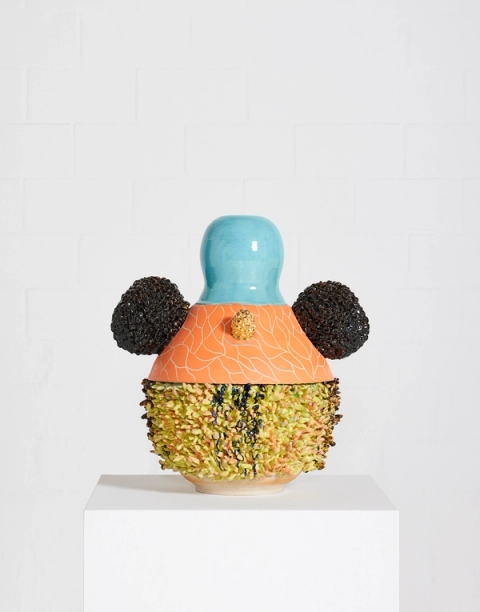
King Houndekpinkou
The New Deities' Platter: Enough For All The Gods To Eat, 2024Glazed stoneware
26 x 26.38 x 20.13 in. | 66 x 67 x 51 cm
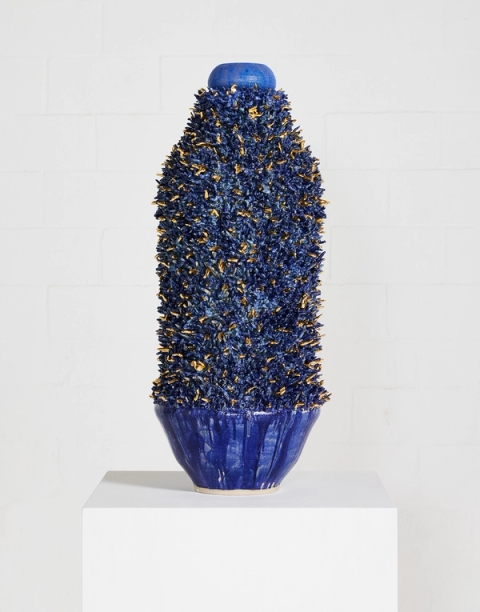
King Houndekpinkou
The Sea Widow: To All Those Brave Men Who Carried You Out of The Sea, 2024Glazed stoneware
39.8 x 16.5 x 16.5 in. | 101 x 42 x 42 cm
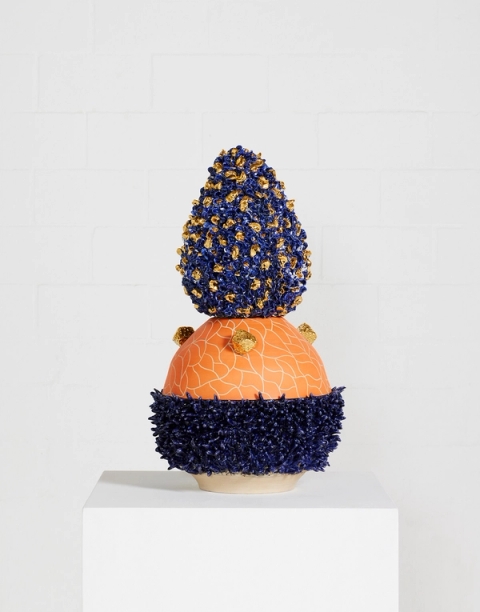
King Houndekpinkou
Outer Space Gold Ritual Vessel: I Refused To Let You Down, 2024Glazed stoneware
32.25 x 18.78 x 18.78 in. | 82 x 48 x 48 cm
Sold
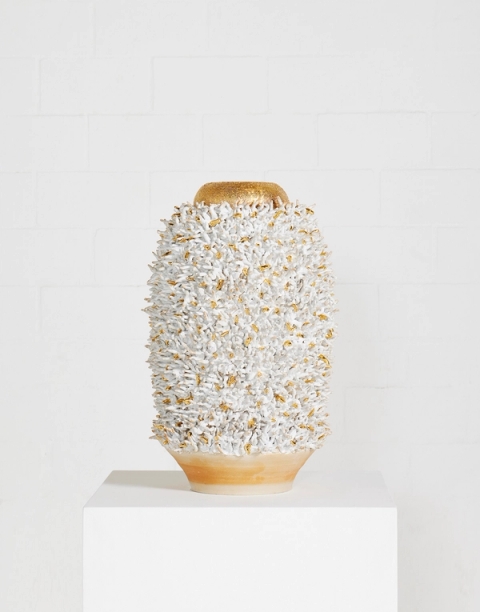
King Houndekpinkou
The Widow of Light: Bruised to the Bone, 2024Glazed stoneware
28.7 x 20.1 x 20.1 in. | 73 x 51 x 51 cm
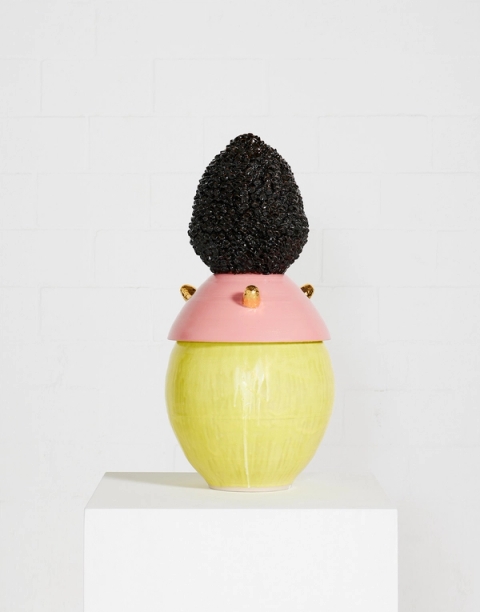
King Houndekpinkou
Jumbo Bubble Tea Doll, 2024Glazed stoneware, acrylic
34.63 x 16.5 x 16.5 in. | 88 x 42 x 42 cm
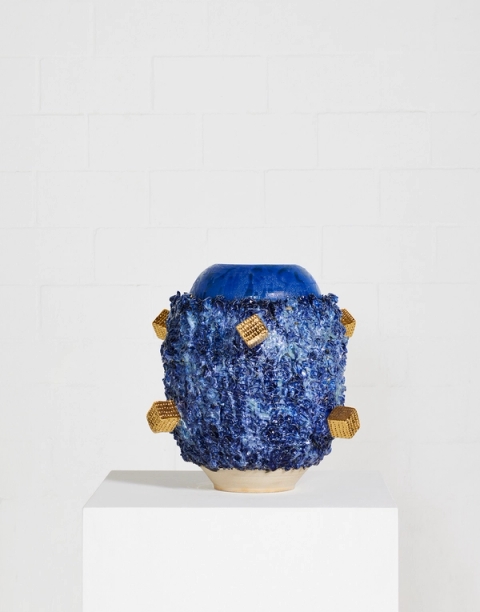
King Houndekpinkou
Blue Cavilux: Excavated From The Wonders of The Underworld, 2024Glazed stoneware
20.78 x 22.5 x 22.5 in. | 53 x 57 x 57 cm
Sold


